Links
English trainer Matt – Learn English for Italians
Transcript
communication is always the most important thing, not the grammar.
I learned my Italian in the street. So speaking about learning languages, um, I did not take an Italian course.
This is Matt from the spoken English code and you are listening to my fluent podcasts!
Intro
Hello guys I’m Daniel, a language learner. The main focus still lies on English. That’s why I try to interview different people in English, mostly about language stuff. And right now, you’re about to listen to Matt, and American guy, an English coach who moved from the USA to Italy.
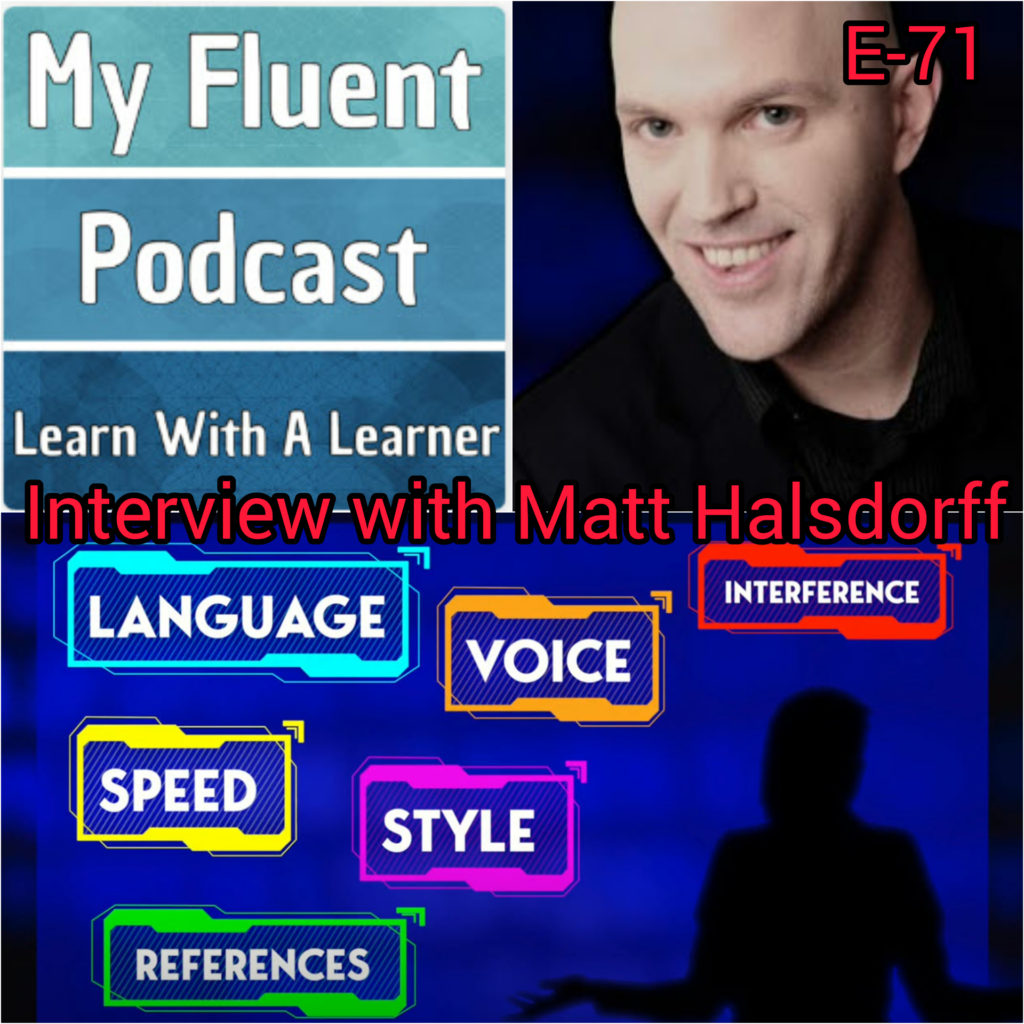
In the interview, he will talk about how it was when he moved to Italy. What he struggled the most when it comes to learning the language. And he would also talk about his YouTube channel, the spoken English code in which he analyzes different celebrities, such as Roger Federer and Michael Jordan. Basically he analyzes their speech.
He also wrote a book about the football scene in turin or Torino. And I could learn a bunch of things. I’m sure you will too. So have fun and buckle up. You are listening to my fluent podcast.
I was just blown away by your YouTube channel, the spoken English code, because I can relate to the way you are making those videos and your attitude in general when it comes to learning languages.
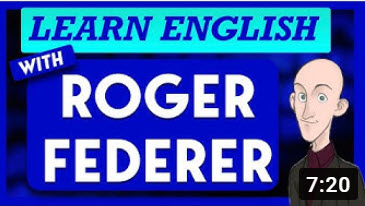
But we will dive into that a bit later. Maybe you could tell us a bit about you, Matt. So who is Matt the communication coach and how (did) you ended (end) up in Italy.
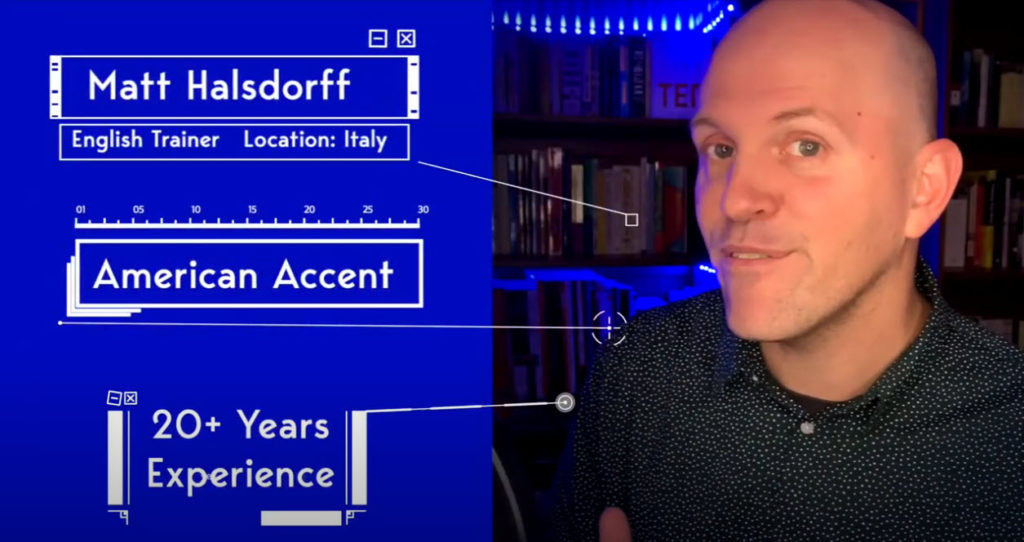
Interview
So first thanks for inviting me here. It’s nice to speak to you and to your audience here. Yeah, I’m from California, so that’s where I grew up. Where I went to school, where I went to college to university and all and I went into university to be a teacher for children though. Okay, for elementary school children.

And yeah, after I went through my school, I love traveling. Like most people learning languages, I just love traveling. And I started traveling in that time with very little money and I changed my idea, my career idea “teach English as a second language” in that time. And that was about 20 years ago, a long time ago. Yeah. And why Italy? I was fascinated with Italy. I just, I love the food. I love the culture, the passion that people have, the weather, I like history a lot as well. And these things attracted me to Italy.
when I first came here, I had no plan to stay for my life
And when I first came here, I had no plan to stay for my life or for a long period. That just happened as I was here
03:05 Daniel: Nice. Yeah. So my guess is that you became fluent in Italian because you are also making videos even in Italian. Is that right?
Matt: Yeah, I can always improve for sure. As anyone learning a language knows we get better every day. Right? There’s so much to do. So I’m always a little afraid to say fluent but yes, I can communicate with it. And it’s what I use in my normal life outside of my teaching and training and everything. My wife is Italian. I met her when I was here. So together we speak in a mix of Italian and in English but mostly in Italian because that’s just our habit. It’s a little faster maybe. And I learned my Italian in the street though. So speaking about learning languages, I did not take an Italian course. I was a young guy alone without any friends or anything when I first arrived. And that was really good for learning language because I was very motivated and motivation is everything in language.
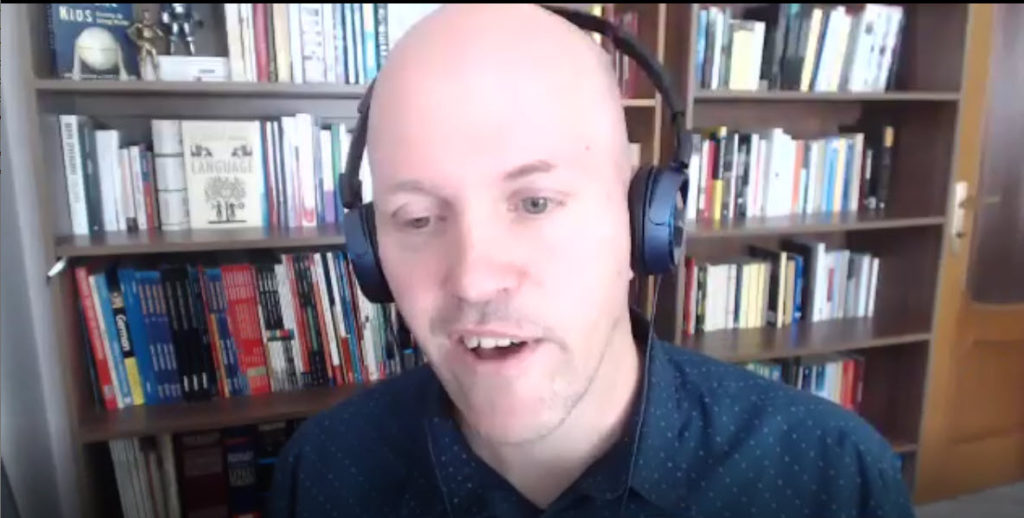
Daniel: You were forced to just speak and there was no other way around, I guess.
Exactly. And I’m happy to be quiet by myself but after some weeks or a long time you want to communicate. And, I moved to a region of Italy Piedmont, or Piamonte in Italian where there are not very many, English foreigners like from the US or the UK or Australia or what?
And so that also pushed the language learning a lot. And in which areas you struggled the most when you learned Italian. You know what I struggled with the most, this may sound funny, but in the first year, I think was learning English grammar. Okay. Like many native English speakers. I had never studied my own grammar in school. I had no idea what the present perfect was or past simple or a subject verb, word, order, whatever. I had no idea what those ideas meant. So when I tried to learn Italian in the beginning, And from a book, not from the street, but from a book I had really a lot to learn because I could not connect it to my English language yeah, I think I learned more about English in the first year than Italian probably. That is kind of funny too. Yeah. Yeah. Yeah. It’s one of the many reasons English speakers are very often bad at learning languages. There are many reasons why one from being lazy and not motivated, there are many reasons why, but another is that we don’t study our own grammar. Really. So it’s a little hard to, to learn, that you conjugate a verb when you have no idea what conjugation is. Yeah, of course. And then you gave English lessons to others. So you became a teacher. Yes, I’m in the very beginning is the same idea. I was, I, maybe was a nice guy. I don’t know. I hope so, but I was not the best teacher in that first year for sure. Because, I had to learn how to explain. I had to learn myself a lot of those concepts. so, but I think going through this learning process of trying to communicate and being very frustrated at a dinner and understanding 10% of the language around you. That made me a much better English trainer or teacher because I was myself in the situation that a lot of the people I work with are in, and you learn a lot of strategies of how to find your way.
And communication is always the most important thing, not the grammar. And you learn in that real life situation I totally agree with you. if I’m not mistaken, you already gave a lesson today . So was it an online lesson you gave? Yeah. From my job side. So, I lived in Italy for three years. Then I moved to Germany for six years. Okay. And there, I was always teaching. I changed to become a business English trainer, so it was more focused on business English. Okay. And since that time, I have returned to Italy but I still train a lot with German companies. Okay. It’s a multinational companies and that’s really cool because I’m at home, but I’m training people in Germany or in China.

And just before now I had the group of Germans and Chinese people working together and I’m trying to help them communicate together. So it was an English training but really we were focused on other things not so much to do with grammar much more to do with other things about communication that it clarifying when you don’t understand and so on. So is it always business English? So for example, I couldn’t, message you and ask for an online lesson with you is that right? No I also do some one-to-one or private groups. I do that too. I’m just more focused on the business English in the past. but of course I still have some one-to-one students, some private students, little groups, But I tend to focus more on that because that’s where my experience is basically. Yeah. Because my experience is there. It’s where I tend to train more in that area. Great.
Daniel: So let’s head to the spoken English code, which is one of your YouTube channels. Maybe you can explain by yourself what it is exactly.
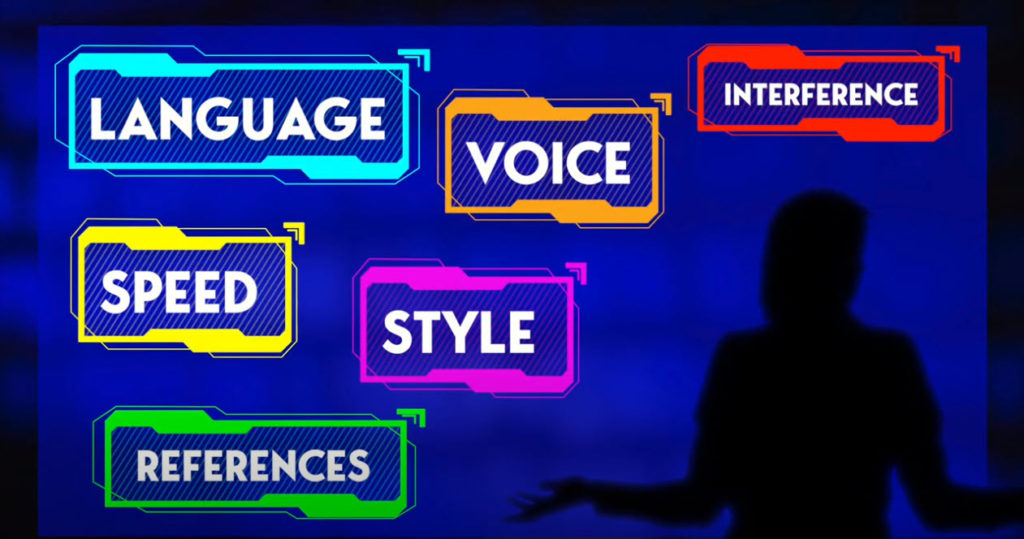
Yeah. it’s a fun hobby, but I love it. So hopefully it’s helpful. What I try to do there is take a piece of language from a interview, from a conversation, especially from a famous person, a celebrity. Maybe from a YouTube video and I take it a piece of it, maybe one minute piece and I go through and I try to explain all of the different things I hear. Okay. From a trainer point of view and I’m trying to help people improve their English listening on that channel, basically because of this business experience a lot of the time I sat in meetings to observe international communication and almost always when there was an American or British person in the room. They destroy the communication because they did not adapt very well. Okay. so I’m very focused on that. They were using too many phrasal verbs or using too many special idioms or reducing their connected speech like “gonna” ant not “going to” and so on those type of things. And on that YouTube channel, I do my best to show that. Because to understand a native, not only native to understand any English speaker, if they’re specially very high level, it’s very dirty that are spoken language. It’s very different than what is written. Then it’s full of confusing things. And I’m trying to show that.
Daniel: Right now I have the image or the audio in my mind, of the video you made about Keanu Reeves. Which was really great, just the way he is talking is really great and also of course how you explain all the details in his speech and I find it pretty cool that you cover non-native speakers, but also native speakers. So we have both there. I was wondering where did you get the inspiration to do that channel?
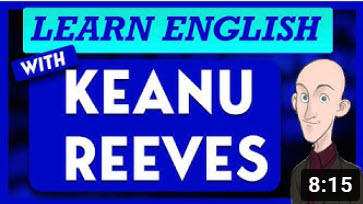
Yeah. With YouTube, about one year ago, more or less, I work a lot online and I love video editing. and I’m a nerd, so I like these things and, I thought I should work on this so I can improve myself as well as a trainer on one hand. On the other hand, during my training, I have to help a lot of people understand advanced speakers, native English speakers. Yeah. So through the years I’ve created my little explanation of obstacles of things we have to be careful of when we understand. Somebody like somebody saying GONNA and not going to, or fillers like Keanu Reeves in the video you’re speaking about, he says, you know, like, I don’t know, seven or eight times within 45 seconds. And every time he does that, it’s a little distraction. It’s a little obstacle. And from my work experience, I thought I wanted to show that, to share that, to try to help people as best I can with the non native English speakers. Yeah. But that’s even more important to maybe honestly, most of the English speakers in the world do not speak English as their first language. So when we are learning English, I never think our objective should be to speak like the queen of England or Keanu Reeves as cool as he is.
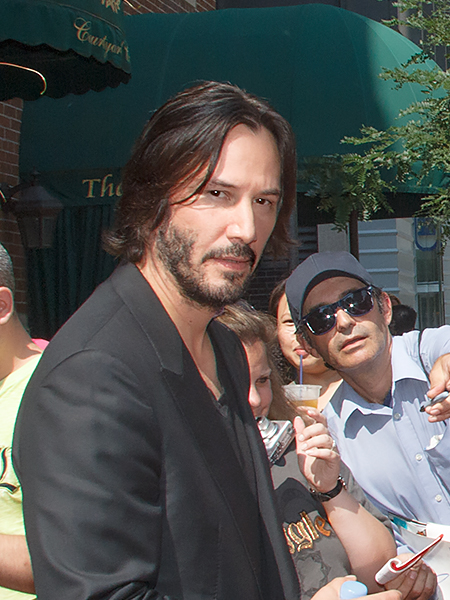
I mean, that’s nice to learn from them, but the reality is when we are speaking at least in business. I see traveling too. We’re often speaking, maybe a Chinese colleague to a Portuguese colleague or Brazilian person on vacation in Germany or what? So we have a lot of communication going on between non native English speakers. And it’s important to exercise that. I think all accents are beautiful. Yeah. And we need experience with hearing them all. I saw that you picked several artists or politicians, athletes, and so on. So how do you pick the people you cover in your video? The way I’m choosing them now or picking them is by request. So basically, if I see something I think is interesting, maybe I’ll create a video on it, but most of the videos are requests from viewers of the channel. Yeah. that’s I like that one. I’m happy because I’m giving them something that hopefully they’re interested in, but it also means I get a big mix and I’m not only choosing people that I just like, but I’m getting a nice mix of different types of speakers. And honestly, every video I’ve made I’ve learned something as well, because does the speaker uses an expression? I know it as a native English speaker maybe, but I don’t know why that expression is you use, where does it come from? For example, what are the origins of it? I know that it’s difficult to understand, but where does it come from? So sometimes I learn as well from that. And where do you get that information? of books or? Okay. Yeah, of course. Yeah. A lot of books behind me, but basically I would search for the expression. and I would search, etymology, which is the history of a word where I worked comes from, or just do some research online and find it. Sometimes, I think if we know the background of a word or we can connect it to some image to a story or whatever it may be, it helps us remember that word more. Right. If you make your own literal connection with it somehow. And, another thing that happens is as a Californian and guy, I don’t really pay attention when I’m listening to other things, native speakers, speaking to every little detail what they’re doing. And when I do this analysis, I really write down what they are saying. And I start to see sometimes. Oh, he made the grammar mistake there. Oh, he used a lot of filler there that naturally maybe we are just filtering out in our first language. Yeah. We don’t hear it. We don’t focus on it, but when you really write it or you see it written, spoken language is very chaotic. Unorganized, confusing. Yeah, that is kind of interesting. I noticed this as well when I am producing my podcast episodes or for example, when I make my transcripts, then after that, then I am listening maybe to other podcasts and all of a sudden I can make out little details, which before I couldn’t make them out in a way. I don’t know why, because oftentimes these are little pieces and spoken very quickly. And maybe I didn’t realize that, but after producing a lot of content, I can understand more, I think. And yeah, it’s, it’s a great side effect as well. I think It’s a great way for you to learn, to increase your language for anyone to increase their language, right. By doing something you learn by doing, we often say, right. And as you learn by doing it, you start to become more aware to notice these things. So, what do you get out of the videos besides that it’s a hobby of yours and that you learn a lot? I get the value to know that I’m helping somebody, hopefully. Yeah. At the moment, my channel is small. It’s not monetized. I mean, at the moment I’m doing that really to help. It helps me become a better trainer. maybe in the future, it’s monetized there’s more to do in that way. but. At the moment. No, I helped somebody. Yeah, that is really great. Thank you for that. Yeah, I think that online, there are so many online YouTube channels and trainers and Facebook groups where you can really find people that are giving a lot of good, good content for free. Maybe they have something extra that’s paid or it’s organized in a faster way. That’s paid and beautiful. That’s good. That’s okay. but if I don’t have the resource, the money for that, I can find really a lot on my own. You can construct your own course, I would say. But I can assure you that it is of great help. And I saw also that a lot of other members, on YouTube really appreciate what you are doing. it’s just wonderful. I wish I had that video back when I started with my English
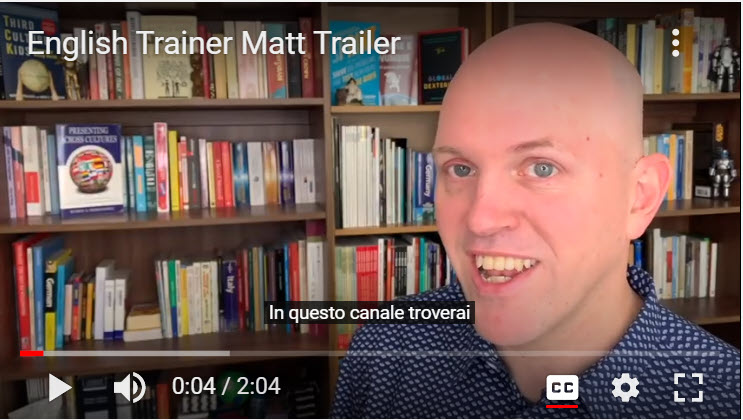
also I saw that you have an Italian. No, it’s not an Italian channel but it is focused to learn English, but the target audience are Italian speakers. Is that right? Can you tell us more about your second channel? Yeah. That, basically I’m just teaching English, trying to teach English and five, 10 minute little videos, but it’s made for Italians. So, So I’m focusing on specific things that Italians would have problems with. Yeah. Maybe false friends, maybe confusing grammar between the two and because I speak Italian and I work with Italians for a long time, I have worked, I made a grammar mistake there yet. I have worked with the Italians for a long time. I’ve noticed, right. As a teacher working 30, 40 hours a week, you start to hear the same mistakes from everybody. And sometimes you notice that they’re specifically from one language yeah from the first language of the person. And so in that Channel I try to explain things in Italian. So I’m mixing Italian and English together. It’s made for beginners of course. Otherwise they should only be in English or it would be a little different. So it’s, it’s focused more on beginners or intermediate learners. Let me say. Okay. And by producing these videos, maybe you could also improve your Italian as well, or? yeah. Yes. Yeah. In fact, that’s one of the reasons why I have started this other channel. The Italian one was first. It was kind of my way to learn how to use YouTube a little more. but for sure it has helped my Italian and I see how my Italian is lacking. Okay. Because when creating those videos. When just normally speaking, I’m not stressed. If I miss an article, if I put an O not an a, I’m just communicating, but when creating like your podcast, I imagine, or a video, you know that everyone’s going to see that you try to be more correct. And, So, it really has made me focus more on little things and it is helping me, at some moments it’s demotivating, because I see how much I need to learn, but you just have to push through that and keep going. Little little.
DanieL: And do you get, (how do you say) you get feedback by, people watching this. for instance, mentioning little errors you made in Italian or do you show it, to someone before you publish? Or how do you process
Yeah. Yeah. I try to have my wife help me out for the parts in Italian. I would write it but I asked her to double check some things but of course I want it to be natural. Not me just reading something. So some mistakes will still come out. I see I make some specific mistakes over and over. Yeah. So it is helping, Do people mention it? For sure. People would hear my American accent and, yeah, for sure. Some people mention it. It’s the internet, it’s a jungle, you know, people would, it would like it. Some people would think it’s really funny. I’m sure some people hate it. It all depends who you find. Yeah. Now living in Italy phase two phase, I have found Italians to be very, very welcoming, to an English speaker speaking Italian because it’s not something they hear very often. So, they typically would not correct a mistake made. They’re really not worried about that. They’re to communicating. On the other hand, when I lived in Germany, for example, it’s a different culture and there’s more a culture of correcting mistakes to help you. And so I think of the German colleagues or German people in the street would correct in a more direct way. Okay. That was hard in the beginning because it was demotivating. What do I prefer the Italian way for me, but that’s not, I think that’s more me. It’s more me because, I prefer to maybe I’m too shy or I’m not confident enough. So I prefer to have the encouragement kind of behind they’re like, ah, che bravo it was so nice. On the other hand of having somebody correct me. No. This article, not this article, at least it stops the communication. Maybe sometimes if the other, communication partner stops you all the time. this is an error on, this was a mistake. Yeah, maybe it depends on our level as well. Like at the beginning. I think the encouragement, the motivation is, is helpful as we improve as we get better. we want to get more corrected but I‘m always more focused on communication anyways. And that’s why probably, I don’t like to be corrected. So hot so directly is because I don’t care. It’s not good for learning the language, but I’m really focused on the message. And I’m not too stressed if it was this I think that is really important. Also. I saw this by me when I am stressed out. I just, I can’t speak fluently. I get. These pauses. And I studder a lot, so, but it is so with my native language, when I don’t feel comfortable, I see that, that I began to stutter there and it’s just, it’s just me because I feel disencouraged or intimidated very quickly. So that’s why it is important to get yourself a situation or an environment which supports you to feel really good. And then you will improve faster. Yeah, we’re all different as well. I see it as a teacher, as a trainer, I have some students of the thousands of people I’ve worked with that really need more, the support, let’s say the smile, the encouragement, the motivation there. and there are others who really want to have very specific corrections and that’s all okay. It’s all good. It just depends on you. It depends where you are on your journey, if you want on your road of learning. Yeah. I have just sent you a picture So maybe yeah, you could describe what you are seeing there? And after that, you could give your opinion. Yeah. So, So, there is a advertisement from a well known, company that says speak German fluently in a month. Okay. 19 hours and blah, blah, blah. Yeah.
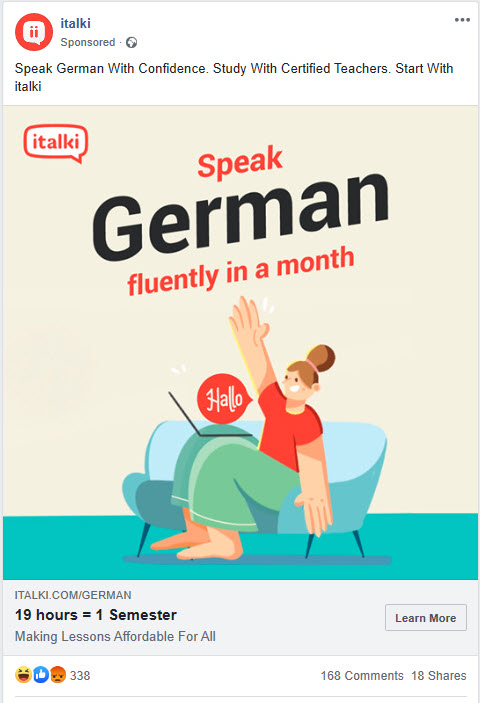
That’s just very funny to me always. It’s just marketing to me because first off, what is fluently? I mean, that’s. That’s always a discussion there too, in one month. okay. I highly highly doubt that you can do that in one month. Language is a long, long marathon. It’s a long journey and we’re always improving little by little in one month. Maybe if you dropped me in to a room with a – don’t tell my wife with a supermodel with Heidi Klum and, we have to stay together for a month, one month. Maybe I would be getting much better, very fast, but one month, I don’t know, fluently. I still don’t believe that. Yeah. What do you think about that? You see these a lot around NA,
Daniel: Yes. I see this a lot. Well, as you said, it’s, it’s just marketing, you know, and it’s clickbait, as well but I don’t know, maybe some learners who don’t know how it works to learn a language. Maybe they get tricked, you know, a bit. So that’s why I don’t find it that good to do such an advertisement, but I find it hilarious to ask my guests also because my podcast is called my fluent podcast for everyone, it means something different what it means to be fluent.
Fluent is such a difficult word. I mean, we can be fluent in another language in one situation because it’s our hobby because we like it. But then let’s speak about gardening or. My son was born. He’s six years old was born in Germany, for example. So I know a lot of words about having a baby in German, but I don’t know those words in Italian, or even in English, there may be some words that I’m missing because I never had that experience, that specific targeted group of vocabulary there. So. Yeah, I think we can be fluent in some moments. And then one hour later I could be a complete beginner again. Yeah, Exactly. So did you take, or have you taken any lessons online by yourself? You know what I have done in the past? I haven’t done it for some time was something like language exchanges. Okay. but I have not spent a lot of money online for learning languages personally. Because I always found another way, like trying to find it and a, a Facebook group or a try to become friends with someone and then exchange in that way. So my focus wasn’t only to learn language, but it was mixed. It was letting me learn my hobby and maybe speak with somebody from another country about this topic and this language, the target language. But I’m just doing that in the other language. So I’m speaking about soccer or football, but I’m doing it in my target language. I want to learn, hopefully I meet someone or, or so, and then we start to exchange messages and in that way, Yeah, I think that is really a perfect method to improve. Yeah. But you have to find the right person who can share similar thoughts or ideas or similar hobby. Yeah. And that’s not an easy to do. It needs a lot of I’m searching sometimes. Yeah. That’s another jungle you can enter. Yeah, exactly. I remember because I, myself, I took lessons online and the greatest teacher for me was a teacher from Chile. And we ended up just talking about life and about everything but grammar. Yeah, I think that online, okay. Of course we can pay. I’m a teacher online. So I understand that, people will pay to find a teacher. If you’re searching for a teacher first, you need to connect with that person in some way. Hopefully there’s you want a good feeling with that teacher and, you want them to be able to give you some feedback, however, they give you feedback to give you some. Some good feedback as you’re speaking but the focus should always be on communication. So if we’re speaking about something we’re speaking about it, but maybe we get some vocabulary here and there and written down or little grammar mistake here. here’s this grammar. I can explain it in two minutes, but let’s keep talking about what we’re talking about. So, where can we find you online while you talked about your YouTube channels, but are there other ways to connect with you ? yeah. If anyone wants to suggest a video, for example if you want to meet you, take a famous person. You like a celebrity also from Chile. It could be from any country. Okay. where they’re speaking in English though. I love it. If it’s a second language speaker, let me know through the YouTube channel, that’s the best way probably I’m on Facebook or Instagram. If you search for my name, which you can find with the podcast, I think, yeah.
Great. Yes. So thank you very much, Matt, I was wondering, you told me the other day that you love listening to podcasts a lot too. do you use them also to learn languages or do you listen to them just for entertainment? both though I’m not actively, let me say, like, I should be learning, a lot with Italian because I live here or Spanish is a language I would love to learn more of. so in my big list of podcasts, I subscribe to, I have a few language learning podcasts. For Spanish, for example, but I also have something in there that’s not focused on language. Okay. They’re just speaking about other topics. Most of my podcasts time has been used trying to learn about YouTube. Okay. Sure. I need to learn how to create, videos so it has been more personal growth. Let me say and not so much focused on language. It depends. I go through different periods. Yeah. but if anyone is thinking of using podcasts, listen to this podcast first, but get a wide range of podcasts. I would mix in some that are made for learning language, but I would really search out something about your hobby. And with many of my students, we have searched out very, very specific hobbies, like chess, archery with a bow and arrow model trains, whatever the person’s hobby was. And you will be amazed how you can find a podcast about that very specific thing. And that for me is gold for learning a language you just need to find different. Podcasts, test them out and see if you find one you like, if you find one, you like, you really will push your English higher or your Spanish, whatever Yeah, I absolutely agree with you. But I think that we have to learn actively as well, or let’s say for me example, I put some reading marks when I come across a great expression, I want to learn. So then I can save it for later and I can go on enjoying the episode, but I think it is important at least from time to time to being active or jot down something we want to learn later, that way we can listen to something we really love. And at the same time we can improve in our language. Yeah. Yeah, and our vocabulary will grow with what we are likely to speak about. So if I like football, I probably will speak about football.
So I’m learning vocabulary that I will use. Yeah. If a wonderful thing is, if you can find a transcript, right? The written words of a podcast, for example, and then you could go back and search out some vocabulary. yeah. That’s, that’s lucky if there’s something like that. if they have it. I’m really sorry about this interruption, but I felt like I should tell you at this point. That I have made a transcript for the whole episode. Check it out on my website, myfluentpodcast.com or you will see it in the show notes wherever you are listening to. And now let’s continue. You will improve. Step-by-step a cool thing about your podcast, for example. Cool. Is that you also have a record of where your language was. So I think that’s very interesting to maybe to some people learning English, for example, is. Record yourself in a conversation somewhere. If you’re not making a podcast, have a teacher interview you or something and record it and don’t listen to it right away, if you don’t want to, because that’s hard. It’s good to do. You can learn a lot from it, but maybe just to save it, if the minimum save it. And then maybe in five years you can listen to it again and you will really, really see how you have improved. Hopefully. Over that time. Sometimes it is difficult to see that we are improving, especially at a middle level, intermediate level, higher level. Yeah. it’s nice to have a record of where we were. For example, well, my very first episode, this was scripted. You know, I had to jot down every single word because I couldn’t manage to speak on my own. And now it changed obviously. And it’s really nice. And as you said, you can relisten to it and you will see how you could change over that time. And it is also great for self analysis because you can correct yourself. And Matt, I am wondering about the book because you are also an author, California Granata. sir.
You did a little research there, yeah. that, that is about football, about soccer is I would say as an American guy, it’s written in Italian. Okay. we wrote it in English then. my wife, luckily is a translator, so she translated it. I understand Italian. I could not write in Italian though, so I could check it very difficult for her because I would say, no, I want this word. I want this word here, but, that is about my experience as an American guy who hated soccer. To change tosomeone who loves soccer. Okay. And it’s my experience in the football stadium of Italy for Torino couch, for Torino football team, Torro, not Juventus which is in Turino, but the other team in Torino. Okay, but now I’m curious. How did that happen that you love football now? Yeah, because, I fell in love with the fans. I fell in love with the team history, with, the old guys who cheer for the team for the tradition, for all of this. I fell in love with the fan base and with this whole cultural around this whole Italian culture around that. Which can ask some good and bad things. I’m not saying it’s perfect, but I really liked that. Yeah. At that time in my life, especially, and for that reason.
So I fell in love with the fans, with the people and the soccer came second. Okay. Yeah. And that book is all about the experience in the stadium, because an Italian football stadium is a very different world than an American football stadium or baseball stadium where fans sit together. And I was totally shocked, like an alien when I was dropped into the Italian football stadium. Okay. I couldn’t believe that the fans are not together. No, I’m really intrigued by that. I think I’m going to have a read I will check it out . I am. I’m really curious about your story. It’s Much more about culture. I would say it’s more about the Italian sports culture than it is about soccer. Yeah. So I’m basically, I explain all of the mistakes, all of the things. I didn’t understand. All of the funny things I did as an American guy who had no understanding of. the inner workings of a football Curva in Italy of the curve is a subculture if you want there. Yeah. I can say though, not speaking a language sometimes is very good for observing. So when I first was there. Like any of us in a situation, in a new culture, you don’t understand everything. So you start to observe things in a different way. You’ve observed the body language, the sound, the way people move, you observe many other things. And sometimes you really can learn a lot from that too. It’s interesting in that beginning stage where you understand nothing. Thank you very much, Matt. It was really great to have you on my fluent podcast.
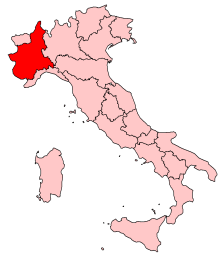
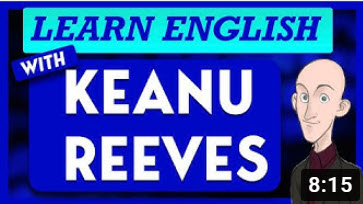
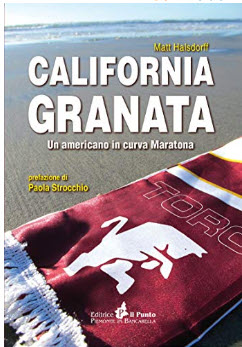
1 Trackback or Pingback